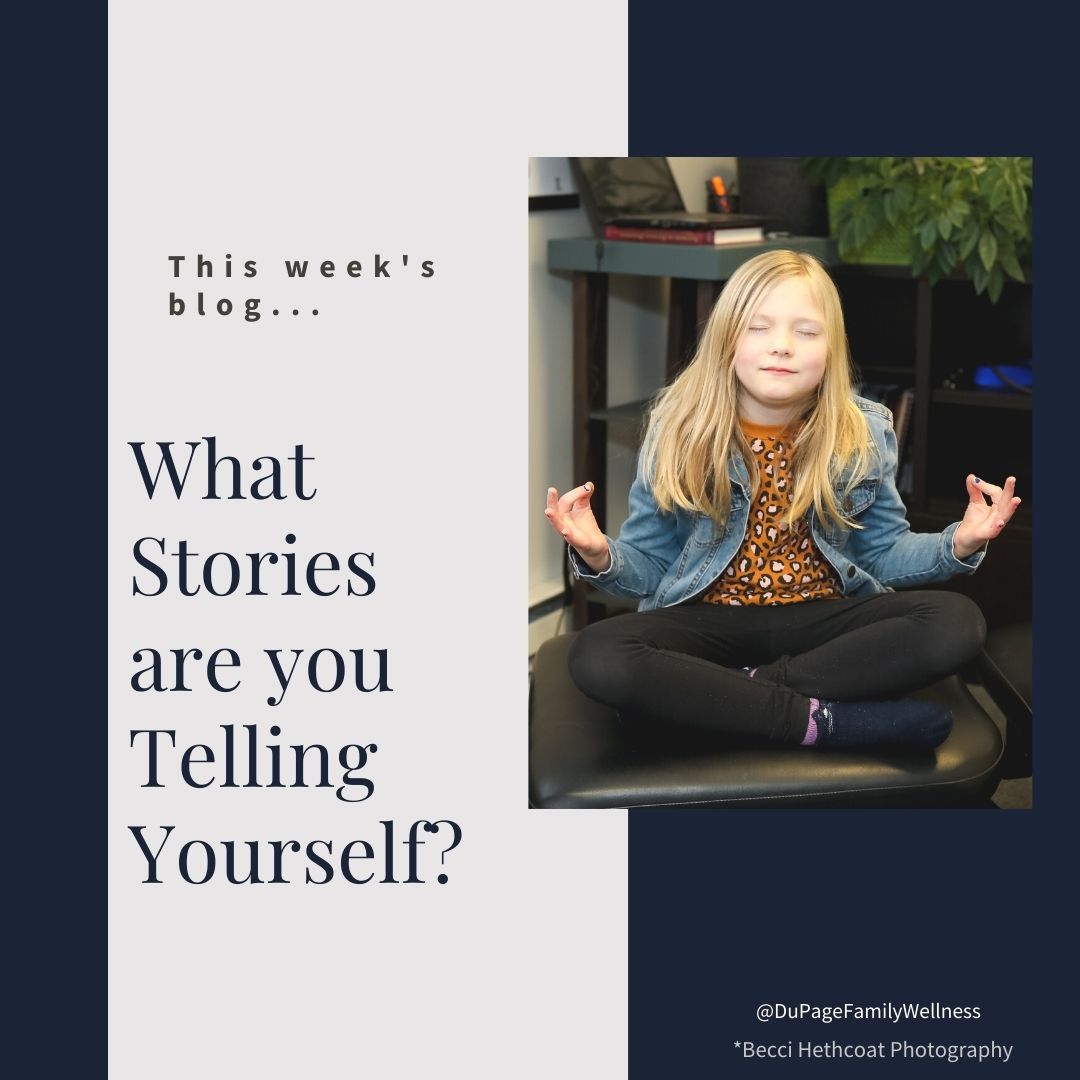 For as long as I can remember, my oldest daughter (7) has been scared to go to bed. She tells me she is scared of the dark or scared to be alone even though she sleeps in the same bed with her 4-year-old sister.
For as long as I can remember, my oldest daughter (7) has been scared to go to bed. She tells me she is scared of the dark or scared to be alone even though she sleeps in the same bed with her 4-year-old sister.
Recently, I challenged my girls to try something new. I explained that if they keep telling themself the same story (I'm scared), of course their brain thinks that it's true.
I continued to share that the secret to feeling something different, is to change what you are telling yourself. Even if you don't believe it yet, when you start telling yourself something enough, your brain will start to believe it and your feelings will begin to change.
What about you? What stories are you telling yourself, and how is that affecting your life? Let’s take a look at it from a child’s point of view and see what we can learn from them.
Changing the Story
I worked with my girls and started practicing positive affirmations. It was a simple concept and very easy to do. I had the girls repeat after me:
- I am safe.
- I am strong.
- I am brave.
Each night when anyone told me they were scared, I reminded them about the affirmations.
Last night, when I gave Harper her good night hug, she whispered in my ear "I am safe, I am okay, I am not scared" and then happily and peacefully went to bed. It was a precious moment that made this mama’s heart glad.
How is this applicable to you?
Let’s take my girl's lead and see if we can change our story. What story do you currently tell yourself over and over again?
- Maybe it's about your looks (I'm fat. I'm ugly.)
- Maybe it's about your finances (I don't have enough money. I’ll always be struggling.)
- Maybe time is more of the issue (I'm so busy. There isn't enough time.)
- Maybe there is something you want to change in your life, but you are afraid of making the change (I hate my job. My relationship isn't working.)
- Maybe your body is hurting or there is a symptom you are struggling with. (I am broken. Things will never change.)
I really encourage you to spend some time thinking about this, and then FLIP YOUR SCRIPT. Maybe it's time to try one (or more) of the following stories.
- I have a pretty face. My body is strong. My smile is beautiful.
- I'm doing what I need to have a better life. There are good things in my future.
- I know how to schedule my day. I have good boundaries.
- I am a valuable employee. Any company would be lucky to have me.
- I am not stuck in this relationship. I have choices.
- My body is strong. I can do the things that will help me heal.
Even if you don't believe the words you are telling yourself when you start, the more you say them, the more your brain will begin to believe them and your reality will start to shift!
Read more ...
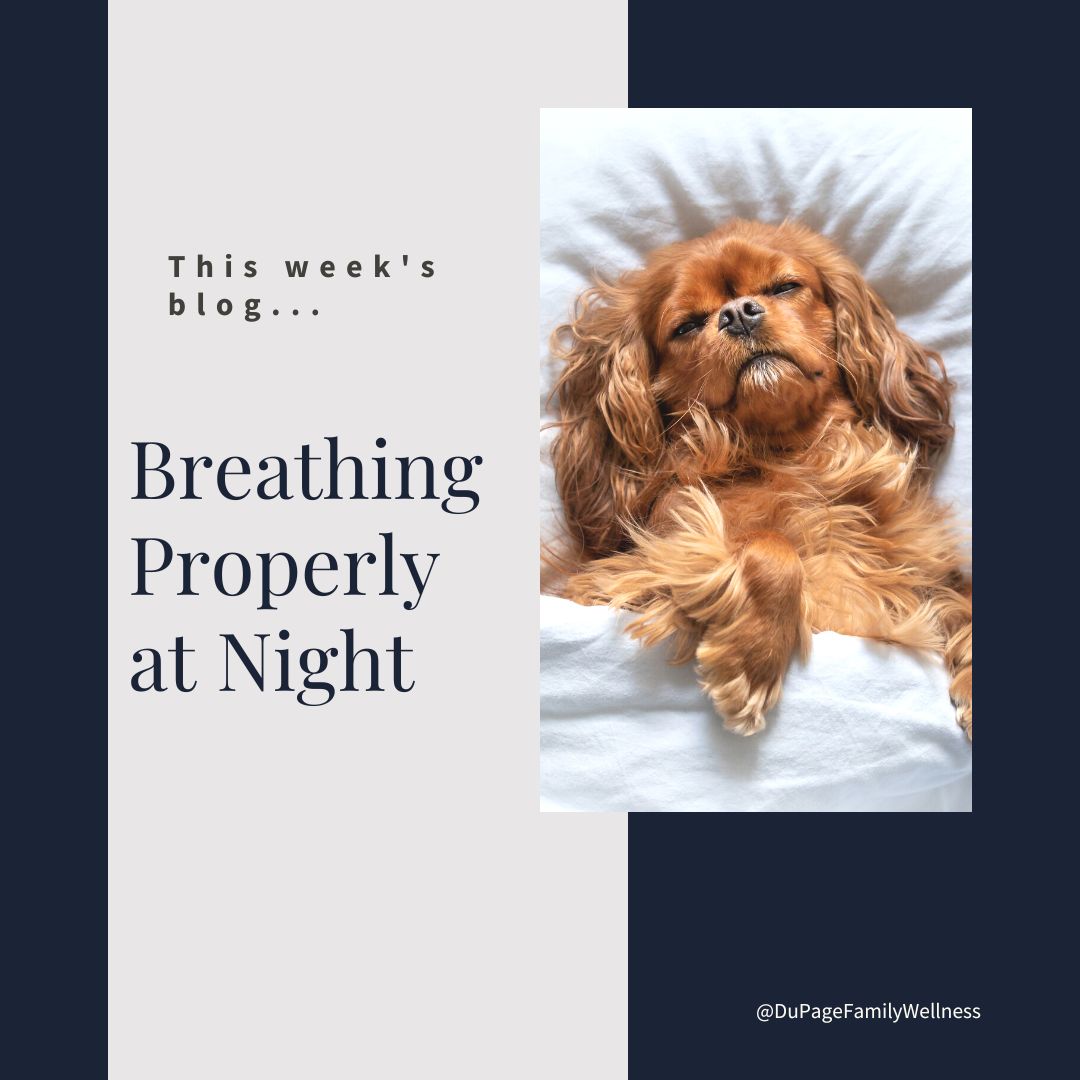 Sleep is one of the most fundamental functions we do each day. Without good sleep, you will not only feel terrible, but you will begin to damage your body. You will likely notice a difference in your energy, mood, and ability to function.
Sleep is one of the most fundamental functions we do each day. Without good sleep, you will not only feel terrible, but you will begin to damage your body. You will likely notice a difference in your energy, mood, and ability to function.
If you consistently wake up from a full night's sleep feeling less than refreshed, you may be dealing with undiagnosed sleep issues. It is always best to be tested by a professional, but in the meantime, there is an easy way to check for a sleep issue in your own home tonight.
This simple test will help you determine if you breathe from your mouth or nose at night. It costs next to nothing and only takes a few extra seconds before bed. Let’s look at what the experts say about this and how to use this information to train your body to sleep well again!
Mild Sleep Apnea
According to Dr. Mark Burhenne of ask the dentist, sleep apnea is the “lack of the ability to breathe properly at night to the point where your sleep is interrupted.” While most people are aware of severe sleep apnea, Burhenne explains that mild forms are often left undiagnosed, especially in otherwise healthy individuals.
Oftentimes a dentist is able to see early warning signs of sleep apnea through features in the mouth. These early signs include gum recession, tooth sensitivity, TMJ, dry mouth, morning headaches, chipped teeth, and nighttime clenching or grinding.
All of these signs can be attributed to the inability to consistently breathe through your nose rather than your mouth. When you breathe through your mouth you do not get the same level of oxygen as you would if you breathe through your nose and it will affect the quality of your sleep.
Why Nose Breathing Is Important
Science has found many benefits of nose breathing over mouth breathing. To begin with, when we breathe through our nose the cilia in our nose act as a filter, purifying the particles of air.
This regulates the humidity and temperature of the air we breathe. As a result, the paranasal sinuses produce nitric oxide which can increase your lung's ability to absorb oxygen by 10-25%. Since nitric oxide has anti-fungal, anti-viral, anti-parasitic, and anti-bacterial properties nose breathing is great for our immune function.
Breathing through the nose also slows and deepens our breath which allows the lungs more time to absorb oxygen and excretes carbon dioxide from the body. Deeper breaths fill the lower lungs which are rich in parasympathetic nerve receptors which help the body to calm and go into the rest, digest, and healing state of being as well.
Dangers of Mouth Breathing
In general, mouth breathing is not ideal, however, in times of danger it can be very helpful. In these situations, we may need to receive oxygen quickly. This is most easily done through mouth breathing. Mouth breathing also fills the upper lungs and triggers your fight or flight state.
While this type of breathing is valuable during intense situations, it causes problems if done habitually. Problems associated with nose breathing include sleep troubles, developmental changes, mouth problems, changes in personality, cognitive issues, and lower immune function. For more information check out this blog post.
Read more ...
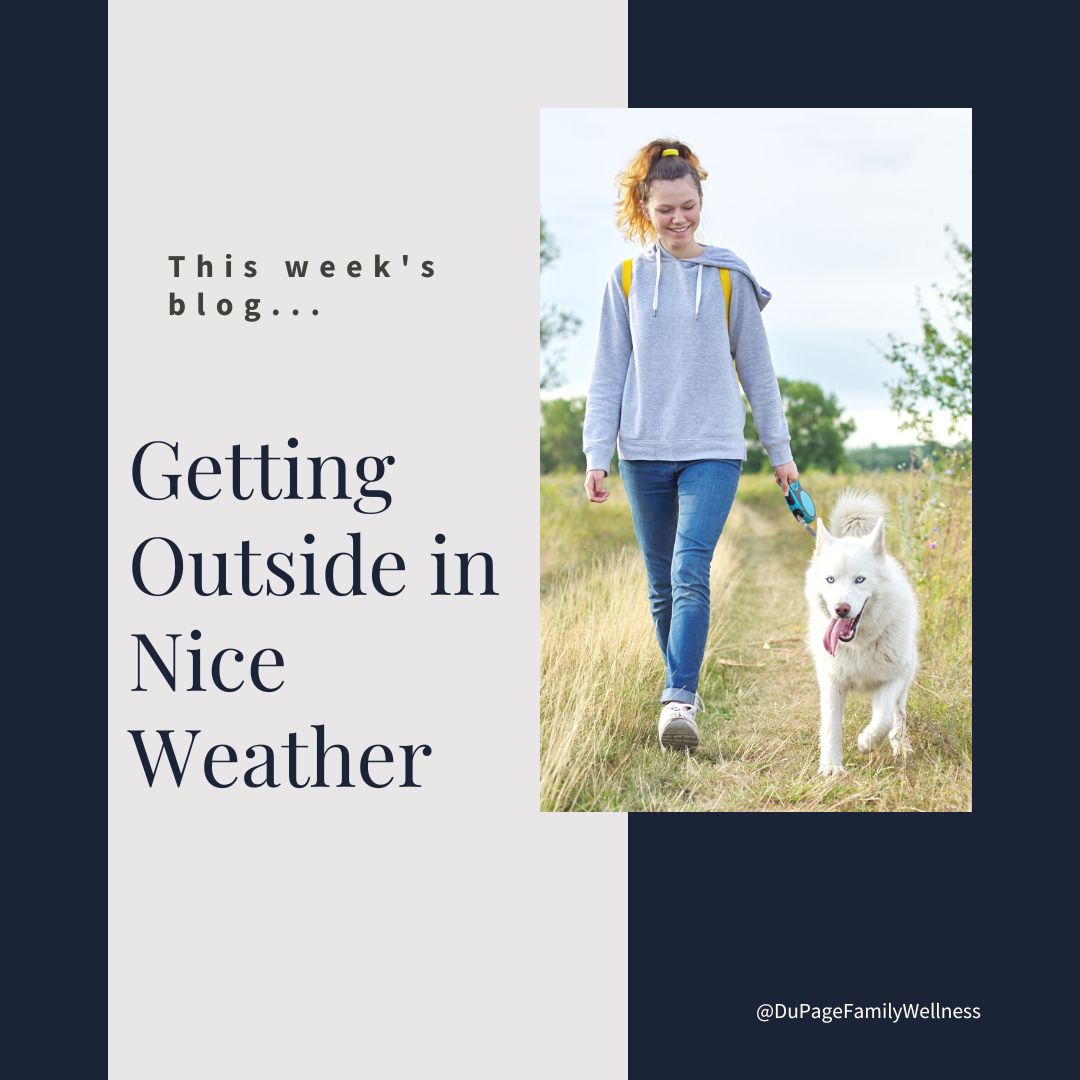 As the weather gets warmer, make sure you embrace the beautiful days by getting outside! Being outside is good for both your physical and mental well-being. This is true for both children and adults.
As the weather gets warmer, make sure you embrace the beautiful days by getting outside! Being outside is good for both your physical and mental well-being. This is true for both children and adults.
Sunshine and nature tend to boost your mood and many people naturally become more physically active when they are getting outside on a regular basis.
Take advantage of the nice weather and make it a point to incorporate physical activity into your daily life in a fun way. With so many amazing places to explore physical activity doesn’t need to be repetitive, boring, or expensive.
Let’s look at some ways to enjoy this weather in an active way you love!
Incorporate Physical Activity into Your Everyday Life
If you live a busy life and struggle to find time to be active, try to get outside for even a short time each day. This may automatically add some movement to your day.
- Establish the habit of taking an after-dinner walk
- Choose a parking spot far away from the building.
- Walk or bike places when running errands, getting together with friends, etc.
- Carry your child or give them a piggyback ride to the car, the lunch table, or at bedtime.
- Talk and walk when getting together with a friend, having a meeting with a coworker, or when taking phone calls.
Make It Fun
Movement doesn’t have to be hard. Finding movement that you really enjoy will help you to move more consistently. If you find something that is fun, you will do it more often.
Movement should never turn into something you dread. You should feel energized after physical activity! Think through the following concepts to find movement that will be life-giving to you.
First, think about your personality and current needs.
- Do you need some time alone?
- Would you prefer some company?
- Do you need to start small?
- Are you ready for something more intense?
Now, pick a couple of activities to start with.
- Go to the park and play with your kids
- Take a walk with (or without) a coworker on your lunch break
- Ride a bike
- Do a yoga video
- Swim some laps (or enjoy water slides)
- Jump rope or jump on a trampoline
- Play hopscotch
- Have a water balloon fight
- Take a dance class
- Try rock climbing
- Play tennis
- Explore your city (or a city near you) on foot
Plan Bigger Excursions for Days Off
There are so many fun places to explore that will get you outside in nature and keep you active. While many of these places could be enjoyed in a brief visit, taking some extra time will enhance your experience.
Don’t be afraid to try something new! You might surprise yourself by finding a new passion - canoeing, archery, hiking, biking, etc.!
I hope you have a wonderful, active, healthy spring and summer! As always, let me know if there is any way that I can assist you in making this a great summer.
Dr. Jamie
 It’s been nine months since “Overcoming Mediocrity” was first published. It’s weird to think that I am a published author. I was honored to share the story of discovering my passion along with 20 other women of influence.
It’s been nine months since “Overcoming Mediocrity” was first published. It’s weird to think that I am a published author. I was honored to share the story of discovering my passion along with 20 other women of influence.
The book is designed to inspire you to find what brings you life and help you step into a life driven by your passion. Sometimes the road to living a fulfilling life is straightforward, but more often than not it is filled with bumps and turns along the way.
My story begins as a child when my family struggled with insulin issues. The series of events that followed eventually led me to find my passion in life.
Here is a little excerpt from my story…
“Growing up my grandpa was one of my favorite people. He was quite the jokester and was always trying to pull a fast one on me. My family went to his house on weekends, and he always made me feel like the most special girl in the world (other than my sister who I’d like to think was a close second).
One evening, as we were preparing dinner my grandfather started acting funny. He was pale and seemed shaky. His words were slurred and didn’t seem to make sense. I didn’t know why my grandpa, who was always so strong, was acting so strange. It was scary!
My grandma ran over to the refrigerator, grabbed the orange juice, and poured him a cup. A few minutes later, Grandpa was back to his normal self.
“What happened?” I asked. I knew my grandpa was a type one diabetic, but I had never known what that meant.”
From here the universe led me to discover my passion. I hope you’ll enjoy reading the rest of my story, but even more than that, I hope you’ll let our stories inspire you to find your passion and live your best life!
Dr. Jamie
P.S. If you are interested in getting your own copy of Overcoming Mediocrity send me a quick message asking me to set one aside for you. We can schedule a time for you to pick it up in the office.
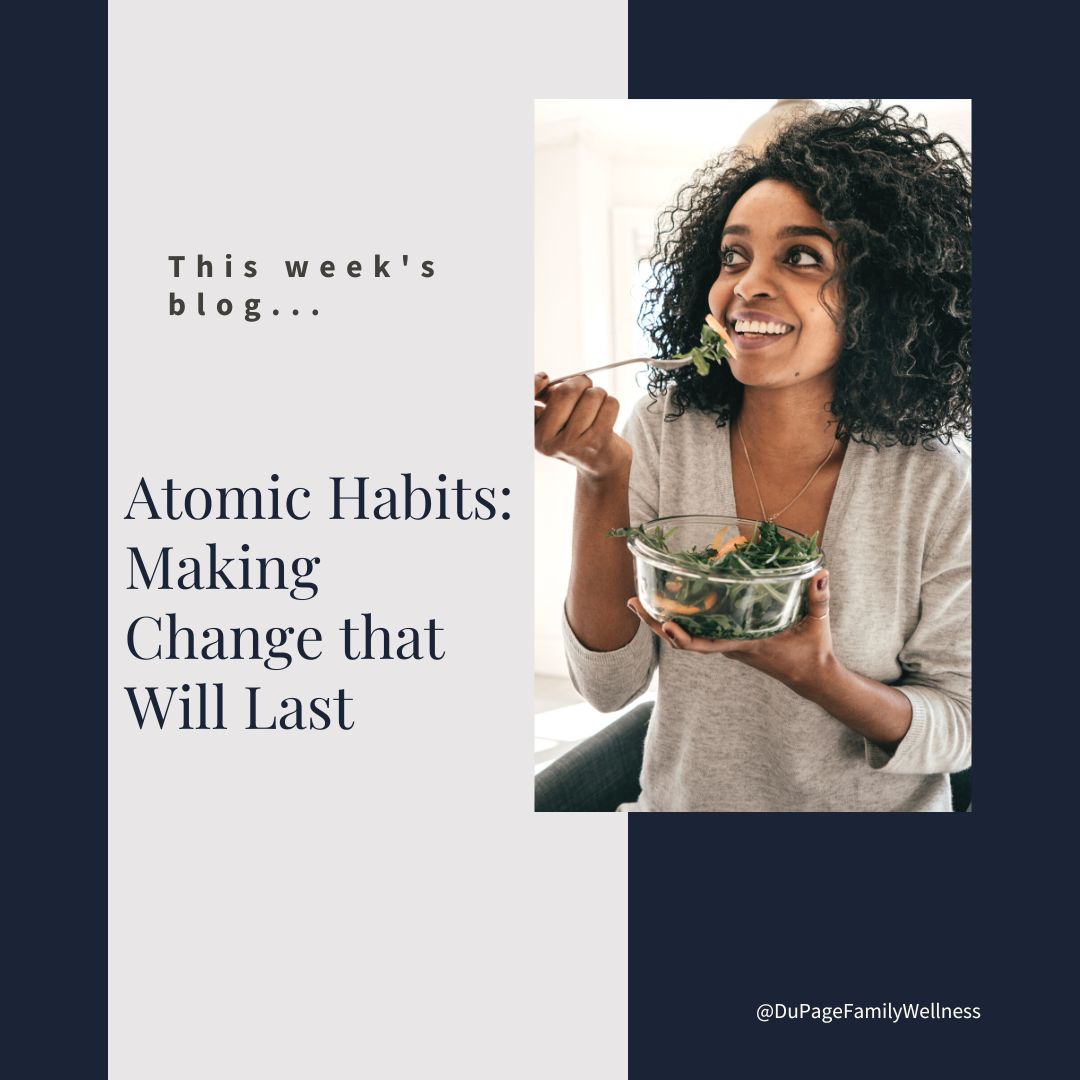 Have you ever wanted to start a habit and failed miserably? Perhaps you didn’t have the motivation to get started. Perhaps you started and didn’t keep up with it. Either way, it can be quite frustrating. You know what you want to do and ask yourself why you aren’t doing it.
Have you ever wanted to start a habit and failed miserably? Perhaps you didn’t have the motivation to get started. Perhaps you started and didn’t keep up with it. Either way, it can be quite frustrating. You know what you want to do and ask yourself why you aren’t doing it.
On the other hand, there may be bad habits that you want to break but continue to struggle with. You may wonder why it is so hard to stop doing things that you know are unhelpful for your goals even when you consciously try to change these habits.
I recently read the book Atomic Habits by James Clear. In it he discusses the process we go through to form habits, breaking it down in what he called “the habit loop.”
Let’s look at this cycle and see how we can use it to our advantage.
Overview of the Cycle
According to Clear, all habits are formed by the promise of reward through a four-step process called the habit loop. This loop consists of a cue, desire, response, and reward.
Our brains continually scan our environment for information. When the information presented predicts a reward Clear calls it a “cue.” Once the cue is noticed, a “craving” may happen where your desire of wanting the reward builds.
Finally, if the craving gives you enough motivation, it’s time for the “response.” The response is simply what you do to satisfy the craving. But we aren’t finished there, in order for a habit to be formed you must actually experience the “reward” in a satisfying way.
The final step in the habit cycle is just as important as the first. Without experiencing the “reward,” the habit will not stick. In fact, without each of these steps, a habit will not be formed.
As the loop is repeated over time, the cue is associated with the reward. This begins the cycle again and eventually, a habit will form. If any one of these steps is missing, the loop will not be completed and a habit will not form.

Read more ...
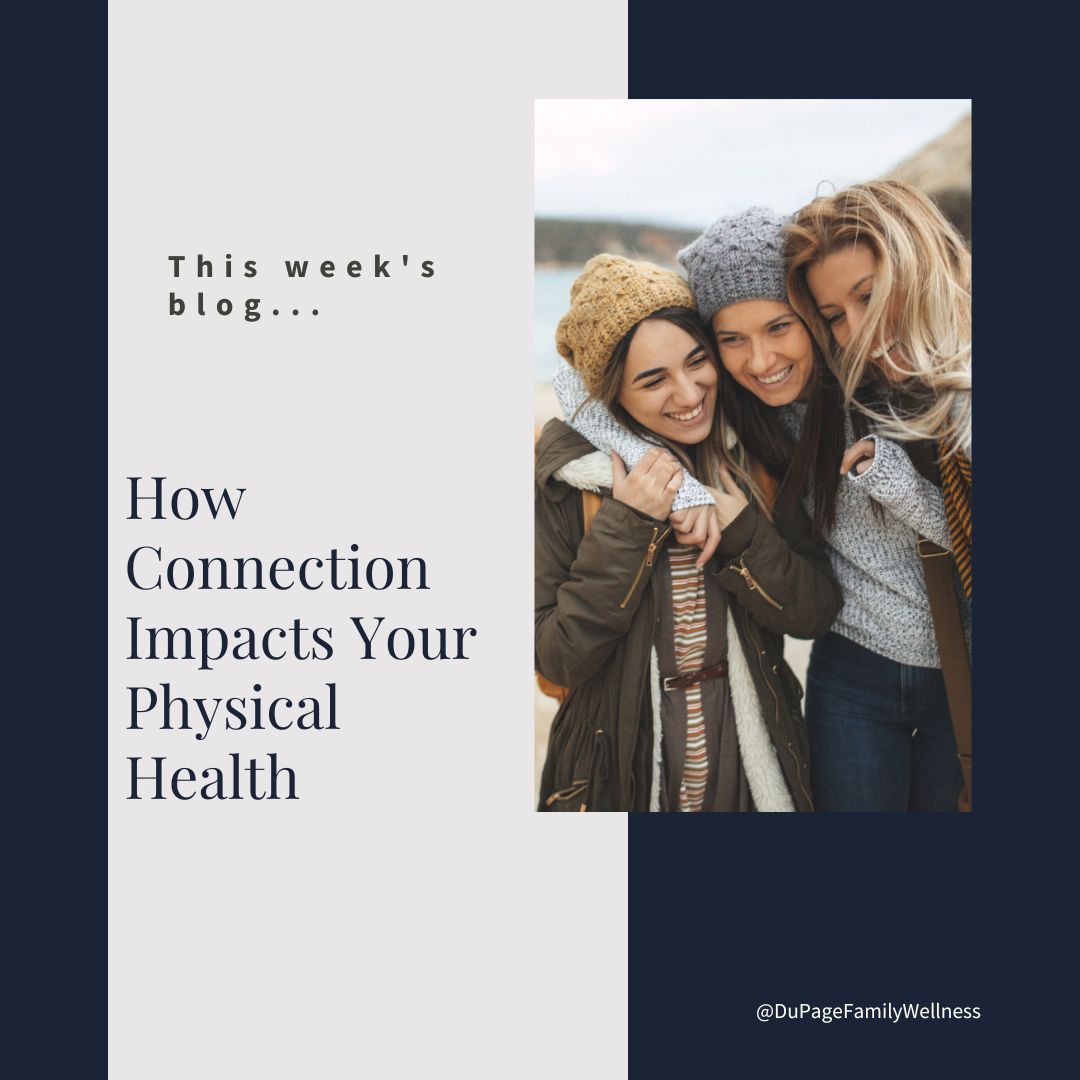 Enjoying social connections is more important for our health than most people realize! In fact, it can directly impact not only your mental health but your physical health as well!
Enjoying social connections is more important for our health than most people realize! In fact, it can directly impact not only your mental health but your physical health as well!
While most people think eating well, getting adequate movement, refraining from smoking, and limiting alcohol are the most important things you need to do to stay healthy, research shows that meaningful connection is extremely important too.
In a culture obsessed with hard work and accomplishments, social connections can feel like a luxury reserved for when the real work is done. But if we are truly putting our health first, connection is of utmost importance for both our physical and mental health.
Let’s look at some research that may lead you to add social connections to your list of healthy habits!
Social Connections Impact on Physical Health
It’s not hard to believe that those who feel more connected with others tend to have higher self-esteem, greater levels of empathy, and struggle less with anxiety and depression. But the extensive impact on physical health may come as a surprise to many.
According to Dr. Emma Seppala, the American Association for the Advancement of Science published a study that found that “a lack of social connection is a greater detriment to health than obesity, smoking, and high blood pressure.” A lack of social connections is actually linked to obesity levels, inflammation, and hypertension.
The health community needs to recognize the importance of connection as the healthy habits it is. When you look into the research, you will understand how crucial these connections are.
Show me the Research
Research done by Housekarl, Landis, and Umberson found that “studies… consistently show increased risk of death among persons with a low quantity, and sometimes low quality, of social relationships.”
Read more ...
 For as long as I can remember, my oldest daughter (7) has been scared to go to bed. She tells me she is scared of the dark or scared to be alone even though she sleeps in the same bed with her 4-year-old sister.
For as long as I can remember, my oldest daughter (7) has been scared to go to bed. She tells me she is scared of the dark or scared to be alone even though she sleeps in the same bed with her 4-year-old sister.

 Sleep is one of the most fundamental functions we do each day. Without good sleep, you will not only feel terrible, but you will begin to damage your body. You will likely notice a difference in your energy, mood, and ability to function.
Sleep is one of the most fundamental functions we do each day. Without good sleep, you will not only feel terrible, but you will begin to damage your body. You will likely notice a difference in your energy, mood, and ability to function.  As the weather gets warmer, make sure you embrace the beautiful days by getting outside! Being outside is good for both your physical and mental well-being. This is true for both children and adults.
As the weather gets warmer, make sure you embrace the beautiful days by getting outside! Being outside is good for both your physical and mental well-being. This is true for both children and adults. It’s been nine months since “Overcoming Mediocrity” was first published. It’s weird to think that I am a published author. I was honored to share the story of discovering my passion along with 20 other women of influence.
It’s been nine months since “Overcoming Mediocrity” was first published. It’s weird to think that I am a published author. I was honored to share the story of discovering my passion along with 20 other women of influence.  Have you ever wanted to start a habit and failed miserably? Perhaps you didn’t have the motivation to get started. Perhaps you started and didn’t keep up with it. Either way, it can be quite frustrating. You know what you want to do and ask yourself why you aren’t doing it.
Have you ever wanted to start a habit and failed miserably? Perhaps you didn’t have the motivation to get started. Perhaps you started and didn’t keep up with it. Either way, it can be quite frustrating. You know what you want to do and ask yourself why you aren’t doing it. Enjoying social connections is more important for our health than most people realize! In fact, it can directly impact not only your mental health but your physical health as well!
Enjoying social connections is more important for our health than most people realize! In fact, it can directly impact not only your mental health but your physical health as well!